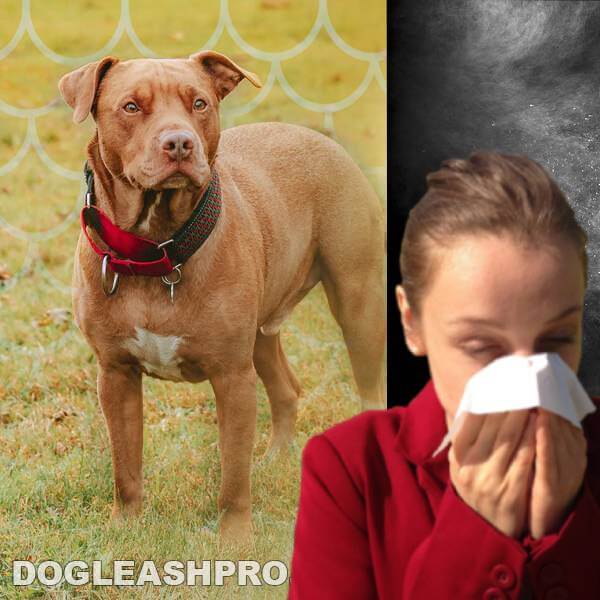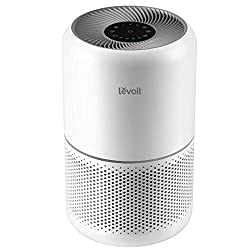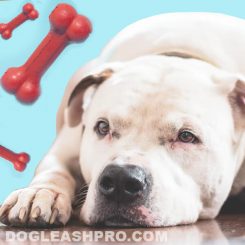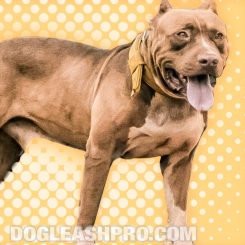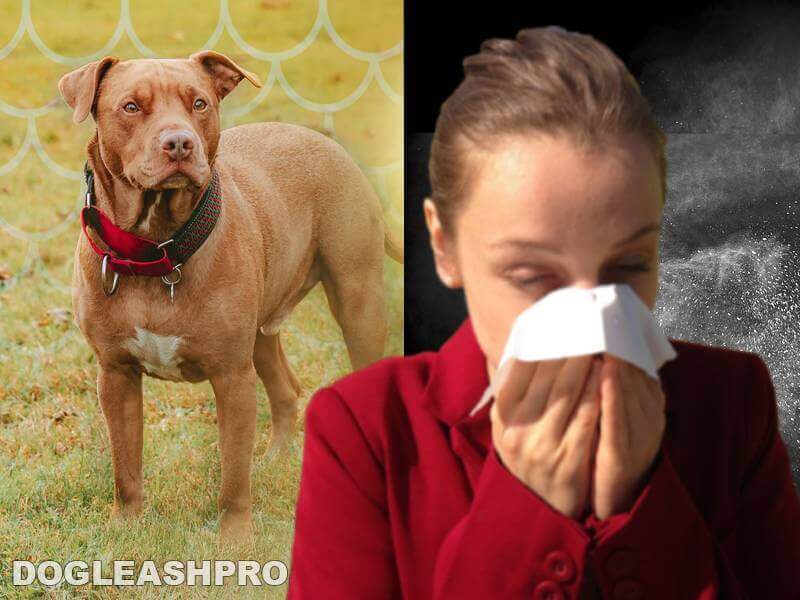
You’re probably thinking about getting a Pitbull and want to know if Pitbulls are hypoallergenic or you’re just curious. Either way, you’ve landed on the right article! There are many reasons why many people prefer to own Pitbulls. Since Pitbulls do have a relatively long lifespan, it’s crucial that owners are aware of what to expect, including whether Pitbulls are hypoallergenic.
Are Pitbulls hypoallergenic? Unfortunately, Pitbulls are not hypoallergenic. While they aren’t the worst dogs for people with allergies, they’re not hypoallergenic either. Pitbulls shed their fur all year round, more so during the spring and fall season. With that fur, they also shed dried skin or dander. Their drool and urine also contain irritants that can cause our allergies to act up.
Table of Contents
What makes a dog hypoallergenic?
A “hypoallergenic dog” is one that is unlikely to trigger any allergies. Considering that about 10% of Americans suffer from canine allergies, you can see why it is essential to know whether a dog is hypoallergenic or not.
Whether a dog is hypoallergenic or not depends on the frequency by which the dog scatters allergens, which are:
- Fur.
- Dander.
- Saliva.
- Urine.
Are Pitbulls Hypoallergenic dogs?
No, unfortunately, Pitbulls are not hypoallergenic dogs. Pitbulls aren’t the worst dogs for allergies, but they are far from being hypoallergenic. Pitbulls spread all of the four allergens we discuss above in some way.
They shed fur all year long, which also carries dead skin. They also love giving kisses, and their drool can be very irritating for someone with sensitivities. If your Pitbull pees around the house, it can also trigger allergies.
Pitbull coats

Pitbulls have short-haired and are single-coated so their shedding is much less than double-coated dogs. Double-coated dogs have a layered undercoat which Pitbulls don’t have.
Still, Pitbulls are the heaviest shedders among all single-coated dogs. They shed all year, especially during the fall and spring seasons.
However, regular grooming and proper nutrition can keep the shedding under control.
Are Pitbull Terriers Hypoallergenic?
No, Pitbull terriers are not hypoallergenic. Pitbull terriers are low-to-moderate shedders and drool quite a bit. While their shedding isn’t the worst, they are still not hypoallergenic.
If you are still considering getting a Pitbull terrier, there are air purifiers like the one below that can alleviate the allergy situation and help purify the air. We use this one in our home and it has helped tremendously all year round with our two dogs in the house.
Are American Pitbulls Hypoallergenic?
No, American Pitbulls are not hypoallergenic. American Pitbull terriers, known simply as Pitbulls, are just as allergy-inducing as other dogs of the pit bull family. Their dander and saliva are allergens and can cause respiratory and skin irritation in some people with sensitivities or extreme sensitivities.
Are Blue Nose Pitbulls Hypoallergenic?
No, Blue Nose Pitbulls are not hypoallergenic. Blue Nose Pitbulls are not a separate Pitbull breed and have the same features as any other Pitbull, which means they are not hypoallergenic either.
Are there Hypoallergenic Pitbulls?
No, there are no Pitbulls that are hypoallergenic. However, some grooming techniques can keep their shedding under control. Various Pitbull owners have managed to keep their allergies in check by minimizing their Pitbulls’ spread of allergens.
You may be interested in Pitbulls Pregnancy How Many Puppies Can A Pitbull Have?
Can you make Pitbulls more Hypoallergenic?
Although Pitbulls are nowhere near being hypoallergenic dogs, there are techniques Pitbull owners can employ to keep their allergies under control. Here are four ways to do that:
1. Allergy medication
Anti-allergy medicines are the best temporary solution to your allergies. These are in the form of pills, syrups, or nasal sprays. Anti-allergy drugs work either by removing inflammation to make breathing easier, deactivating the substance that triggers an allergic response, or decongesting the nasal path.
2. Air purifiers
Allergens are usually carried by air, so an air purifier can minimize the risk of you inhaling them. By trapping the pollutants in specialized filters, an air purifier improves the air quality of your room over time.
3. Flushing your nose
Allergens stuck in your nasal path will keep your immune system falsely triggered as long as they are there. Cleaning your nose with a nasal spray, cleaning solution, or saline water can help flush these pesky particles and calm your allergies.
4. Allergy shots
Immunotherapy is a more permanent solution for your allergies. This process involves a course of allergy shots administered over a specific period. Their purpose is to slowly reduce the immune response to allergens by getting it used to them.
Complications from being allergic to Pitbulls
1. Asthma
One of the more severe symptoms of allergies is chest congestion, blockage of the nasal path, and difficulty breathing. These are signs that your sensitivity to the Pitbull allergens is too high. If you or one of your family members has asthma, allergies can make things worse.
Luckily, there are air purifiers that can help alleviate some of the allergies sensitivities if you have a dog at home:
2. Skin conditions
Allergies can sometimes cause itching, redness, and inflammation on your skin. These situations usually happen when you touch, hold, or hug your Pitbull. If you’re experiencing hives, eczema, and non-stop itching on your skin, it’s best to see a physician.
3. Trouble sleeping
Allergies cause inflammation of the nasal passage, resulting in wheezing and breathing difficulties. Sleeping can be difficult with these issues, as you frequently wake up due to congestion or sounds of your own wheezing. Sleeplessness can cause fatigue and psychological stress.
Diagnosis for allergy to Pitbulls
1. Visual test
This simple test involves checking for swelling, paleness, or bluish hue on your nasal lining. The doctor may also have follow-up questions to determine whether your condition can be attributed to a dog allergy. This test isn’t a confirmation but provides a direction for further tests.
2. Skin test
This test involves pricking your skin and inserting a tiny amount of allergic substance (animal protein extracted from your Pitbull in this case). After 15 minutes, the area is inspected for redness, swelling, or itching. If that happens, you’ve tested positive for Pitbull allergy.
3. Blood test
If a skin test is not an option, a blood test can reveal the reason and extent of your allergies. This test involves examining a sample of your blood and checking for the presence of a specific antigen responsible for triggering the allergic reaction.
12 tips to minimize Pit Bull allergens in your home
1. Frequent vacuuming
Allergens can spend a long time in carpets and drapes, and cleaning them is no easy task. Frequent vacuuming is the best way to suck out dirt and fur from these surfaces.
2. Potty training
Urination around the house can be problematic for many reasons—not just allergies. Training the dog to do their business outside will keep your home free from smell and the diseases that dog pee carries. Pitbull owners can start by crate training as one of the ways to potty train their pooch.
3. Frequent bathing
While Pitbulls do well with a bath once a month, you should bathe them every week if you’re allergic. Frequent washing will keep the Pitbull’s hair clean and free from dirt and dander.
4. Regular grooming
Pitbulls shed frequently, but their hair loss can be managed through good grooming habits. Frequent brushing keeps the dog’s fur from collecting dirt, dander, and loose hair.
5. Cleaning the drool
Pitbulls drool a lot, and their saliva is a common allergen. We highly recommend that Pitbull owners clean the doggy toys thoroughly after playtime and wipe any wet surface that you see around the house.
You may be interested in: Best Indestructible Dog Toys
6. Avoiding licks
Licking is how Pitbulls show love. However, if you’re allergic, these licks will only cause you suffering. It’s best not to get licked at all, or at least avoid getting licked near the face.
7. Ditching carpets
Carpets can trap a lot of dirt, dander, saliva, and other allergens. They’re also pretty hard to clean. Ditching carpets for tiled or hardwood flooring would make cleaning easy and keep allergens from piling up.
8. Cleaning air filters
Air cleaners and special air conditioners can trap airborne allergens. However, they can’t work correctly if their filters are clogged. Frequently clean the air filters or replace them when it is time to keep them running efficiently.
9. Setting boundaries
Keeping the Pitbulls from entering certain rooms can help contain and control the spread of allergens in your house. If someone in your home is allergic, you should make sure the Pitbulls do not get into their room.
10. Washing yourself
Washing the dog is half the work; you should also wash your body frequently. You should also keep your hands, clothes, and bed sheets clean to keep them free from any allergy-inducing particles.
11. Changing the diet
Certain nutritional imbalances can increase shedding, whereas certain foods can improve fur quality and reduce hair loss. Food allergies can cause Pitbulls to drool and release mucus excessively, which you don’t want with your own allergies.
12. Vet’s help
If your Pitbull is shedding excessively, you might want to consult a vet. Certain medical conditions can cause abnormal shedding in dogs, and it’s best to rule them out first.
So, Are Pitbulls Hypoallergenic?
No, Pitbulls are not hypoallergenic. Unfortuanately, none of the Pitbull breeds are hypoallergenic, and they’re best suited for people who don’t have any canine allergies. However, even if you have allergies, you can manage them through some lifestyle changes and medication.
Related Questions
Yes, Pit Bulls can be bad for allergies. People with moderate to high canine allergies may want to steer clear from Pit Bulls.
No, a Pit Bull terrier is not hypoallergenic. A Pit Bull terrier, is also simply known as a Pitbull, which sheds allergens in the form of fur, dead skin, and saliva.
Pitbulls shed moderately all year-round, with spring and fall being their peak shedding seasons. Nevertheless, they’re far from being the heaviest-shedders among canines.
If a dog has dry skin, loose fur, inability to hold its pee, and have excessive drooling habit, they it is unsuitable for people with allergies and sensitivities to allergies. The dog’s size also plays a role, with small dogs being less problematic than large ones. Surprisingly, the coat length doesn’t matter.
DISCLAIMER: THIS WEBSITE DOES NOT PROVIDE MEDICAL ADVICE
The information, including but not limited to, text, graphics, images and other material contained on this website are for informational purposes only. No material on this site is intended to be a substitute for professional veterinary advice, diagnosis, or treatment. Always seek the advice of your veterinarian or other qualified health care provider with any questions you may have regarding a medical condition.
Resources:
https://www.ncbi.nlm.nih.gov/pmc/articles/PMC5809771/
https://www.lung.org/clean-air/at-home/indoor-air-pollutants/pet-dander

With over five years of specialized experience as an animal writer, my expertise lies in dog nutrition, health, behavior, grooming, and training. I am dedicated to delivering helpful and informative content that caters to the well-being of our furry friends. My primary goal is to empower pet owners with knowledge and ensure our canine companions thrive in health and happiness. In my free time, I love volunteering at local dog rescue centers.
